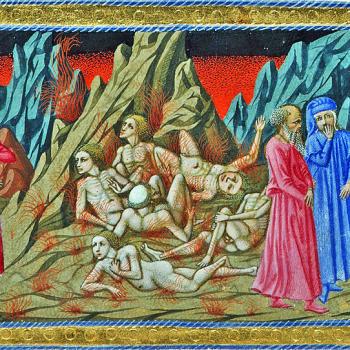 Scripture is not meant intended to be a book which we simply pick up and read if we want to know and understand the truths it proclaims. Its intention was to be the central witness of the Christian faith, to be the standard declaration of truth which was read to the faithful so that through continuous hearing of the text, they will consistently gain new and greater insights to the truth of God. If and when someone were to come around and read the text outside of the liturgical setting, for in-depth study and engagement with the messages contained in it, they were expected to understand this as they search the Scripture and come out of their study several complementary interpretations of the texts which they read. It is not a book with one simple meaning which is easily ascertained by all; rather, it is intended to be filled with a diverse variety of meanings which require contemplative engagement if we are to discover them and employ it properly in our lives.
Scripture is not meant intended to be a book which we simply pick up and read if we want to know and understand the truths it proclaims. Its intention was to be the central witness of the Christian faith, to be the standard declaration of truth which was read to the faithful so that through continuous hearing of the text, they will consistently gain new and greater insights to the truth of God. If and when someone were to come around and read the text outside of the liturgical setting, for in-depth study and engagement with the messages contained in it, they were expected to understand this as they search the Scripture and come out of their study several complementary interpretations of the texts which they read. It is not a book with one simple meaning which is easily ascertained by all; rather, it is intended to be filled with a diverse variety of meanings which require contemplative engagement if we are to discover them and employ it properly in our lives.
If we want to understand Scripture, we must reject the notion that there is only one intended meaning, one intended reading, for every text. The Holy Spirit, who we believe guided the writers in some fashion or another to write the inspired texts they left us, sowed within the texts many different meanings, some which will only become known once the seed is watered with the right hermeneutic lens.
We can get a sense of this from the opening of the Gospel of John:
In the beginning was the Word, and the Word was with God, and the Word was God. He was in the beginning with God; all things were made through him, and without him was not anything made that was made (John 1:1-3 RSV).
Notwithstanding the questions related to the relationship between the Word, the Logos, and God, which can and do fill huge volumes of theological text, what we can note is that the text says that in and through the Word everything was made, and without him, nothing was made, with the Greek for John 1:3 reading “πάντα δι’ αὐτοῦ ἐγένετο, καὶ χωρὶς αὐτοῦ ἐγένετο οὐδὲ ἕν ὃ γέγονεν,” in which it can be said that “οὐδὲ ἕν” means “not one” or “not anything’ or, as it is often translated, “nothing.”
The simple reading of this passage, which is they way most engage it and understand it, is to see it as explaining the creation of things. In this fashion it can be said that the Word, who was with God and is God in some sense or another, was the means by which all things are made. In and through the Word, all things are established. Flowing from this, theologians like to discuss how the Word, the Logos, established the logoi of creation, meaning that the one Word established in and through itself, in a derivative fashion, many words or principles which delineate and produce the essences of all the things which exist.
What is not so obvious, and yet is able to be ascertained by this passage, is a description and explanation for sin. Sin is not a thing, indeed, it is the nihilistic destruction of being, where the good things which the Word created finds themselves being destroyed. Their very nature, their very being is slowly destroyed by sin, so that as those things exist, they become less than what they are by nature. Sin is not a thing, and so is not made by the Word, but more than that, without him, without the Word, was this nothingness of sin made or established: those who set themselves apart from the Word, those which try to stand up as individuals apart from the Word and act contrary to the principles established by the Word are the ones who establish evil insofar as they act contrary to the Word. Therefore, the not-being of sin, the οὐδὲ ἕν, is made by those who act in opposition to the Word, making them without the Word. As the Word is establishes the rational principles of creation, sin is produced in irrational activity contrary to the good which is intended by the Word. Thus, as sin is not a thing, so it is not made by the Word. This is why John is able to say that without the Word we find οὐδὲ ἕν, the emptiness of being which destroys beings, is established.
This οὐδὲ ἕν, this nothing, must not be confused by equivocation with the transcendent nothingness of God which transcends being, but rather, it must always be understood as the denial of being. Sin is οὐδὲ ἕν, the denial of the One, the denial of the being which comes from and exists in God. Sin comes from the nihilistic rejection of being. The rejection of God being discussed here, the denial of the Word, must not be confused as some agnostic confusion about the existence of God, but rather, in relation to the principles established by God. Some might not know or understand God and yet follow with the good which God intended and so not said to be willfully acting contrary to the good of creation. It is the abandonment of that good which allows for and sets up fractures in the realm of creation which break apart and demolish the nature of being itself. This fracture was not established by the Word, the good creator who made all things good. For we must understand the Word, in creating all things, preserves them and holds them together in an integral whole; rather, it is in and through the embrace of not-being by those who abandon the rational order of being, the Logos, such as through an irrational attachment to the self, that not-being, οὐδὲ ἕν, is established. This not-being must not be seen as a rival principle to being; it is not a nothing, for it is the negation of all principles and things as they are, seeking to take being and destroy it, turning it into nothing.
This is why, Origen suggests, John was not merely repeating himself when we wrote, “without him was not anything made that was made.” As the text already said all things were made for him, so Origen suggests, we should consider and ponder what John intends us to learn from this discussion of nothing, and when we do so, we see emerging a theological explication of being and non-being, of goodness and sin:
Now we said before that “not being” and “nothing” are synonyms and for this reason those “who are not” are “nothing,” and all evil is “nothing,” since it too is “not being.” And evil, which is called “nothing” has been made without the Word, not being included in the “all things.” We have presented, therefore, to the best of our ability, what the “all things” are which have been made through the Word, and what that is which was made without him, and, because it never was, is also for this reason called “nothing.”[1]
Origen then explains how all have an implicit connection with the Word of God, the Logos, for as it is the principle of creation from which we emerge, it is also there teaching us, guiding us, directing us in our understanding insofar as we seek out the rational principles of creation. In this way, as our intellect seeks after and engages reason, the Word is already “inseparable” from us.[2] We all have some relationship with the Word in and through our conscience. When we ignore our conscience and reject it, then we are acting without the Word and engage in sin, causing the corruption of evil to penetrate the world. Evil, therefore, is not made through the Word, and the Word should not be blamed when such evil is established because it is not the Word, but the subjects of the Word who abandon the Word as they reject what their conscience suggests to them who bring about that evil, or as Origen also explained, “just as we must not blame the teacher who has shown the student what he ought when the one who errs no longer has any ground for defense as though he were ignorant, because of the teacher’s lessons.”[3]
This is why, though all things were made by the Word were made good, those given the good of free will can create, as it were, the nothing which destroys being, and insofar as they do that which should not be done, they create evil. Nonetheless, even though they do evil, their existence, indeed, the being which was given to them, remains good insofar as it remains. Evil is not a creation of God, while their essence and their existence is. In this respect, all things, insofar as they exist, remain good; insofar as they withdraw from the good given to them by the Word, they suffer corruption and can be said to be evil. This is why Origen said that the being which is known as the devil is good insofar as he exists and is a creation of God, and in that goodness he is not even known as a devil.[4] What exists after that fracturing we often give a new word for it, representing its new form. But we must still realize they remain connected to their original creation and keep some of that good which can be patched and repaired by God.
Scripture therefore, tells us all things are made by the Word, but it also tells us that in rejection of the Word, the destructive οὐδὲ ἕν of nothing is possible. Unless we understood the relationship between being and goodness, and sin and nothingness, it would be difficult for us to perceive this implication of the text and we would readily pass over it as we read Scripture, thinking John merely repeated the theme of creation for the sake of emphasis. What is true here, is true elsewhere in Scripture. Hidden in it are many different meanings, and if we want to gain from Scripture, we must be willing to search for them and bring them out into the open.
[Image=Wormhole by Alain r (Own work) [CC BY-SA 3.0 (https://creativecommons.org/licenses/by-sa/3.0) or GFDL (http://www.gnu.org/copyleft/fdl.html)], via Wikimedia Commons]
[1] Origen, Commentary on the Gospel of John Books 1 -10. Trans. Ronald E. Heine (Washington, DC: CUA Press, 1989), 120.
[2] See ibid., 123.
[3] Ibid., 123.
[4] Cf. Ibid., 119.












